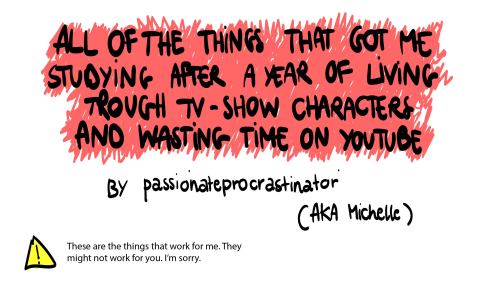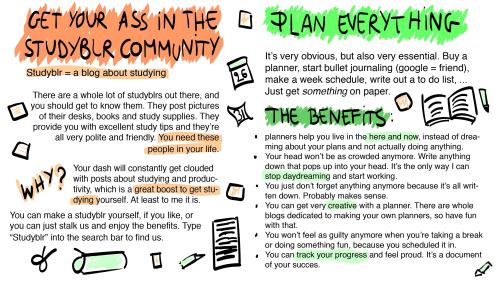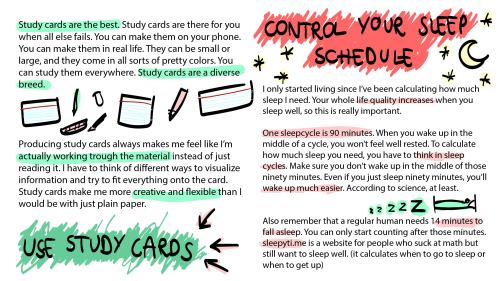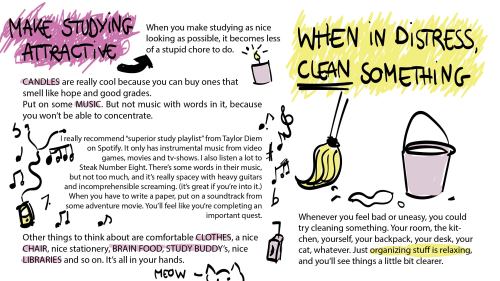So, It’s That Time Of The Year Again, Back To School. And Right Now, Some Of You Are Probably Panicking

So, it’s that time of the year again, back to school. And right now, some of you are probably panicking a little because, let’s face it, school starts soon and you have not glanced at your to-do list since June. But don’t be afraid, lots of us are in the same boat. I myself ambitiously drafted out a long list of things to do this summer, including studying C++, studying Chinese, preparing for new course work, studying quiz bowl, and exercising. However, I was abroad for five weeks, spent lots of weekends at the beach, slept in, and generally slacked off. Now, it’s not too late to pick up the pace and get into the study grind to get a good start this school year. Below are some useful tips!
Academic Tips:
Print off your new school schedule immediately and build your personal schedule around that. (Figure out which time blocks are for studying, exercise, sleep, mealtime, extracurriculars, and chill time.)
Buy a planner and start using it. It doesn’t have to be personalized or fancy, just make sure it suits your taste and is usable. Even though you may not have classwork right now, start using it to complete tasks and get in the habit of writing in it.
Search up your teachers/professors on RateMyProfessor to (kinda) know what you’re in for. Obviously, those reviews are a little skewed so read them with a grain of salt, but know which professors are lecture heavy and which classes rely on the textbook. This really helped me last year.
Get in the habit of reading and writing a bit everyday. That way, your first assignment won’t be nearly as painful. Just write a little in a journal or read some NYT articles to critically engage your brain.
Look over the first chapter of your textbooks. The first chapter and introduction in books really explain what the course is about, so if you’re afraid of feeling stranded in class, read them.
If you have questions or concerns about your courses, email your professors or teachers. They want to help their students.
Map out where you have to go for each class. Whether it’s changing floor in the same building or booking it across campus, make sure you know where you’re going the first week of class. Highlight your routes on a map of the school if you need.
Lifestyle Tips:
It’s nice to sleep in over summer break, but start waking yourself up earlier. Figure out what time you need to wake up, factor in the 7-8 hours of sleep you need, and determine the ideal bedtime. Set an alarm and start slowly winding back your wake up time. For example, if I need to get up at 7:00 AM for school, I’ll sleep until 8:30 for one week. Then I’ll wake up at 8:00 the next week, and 7:30 the week after that so my body can slowly adjust to the earlier mornings.
On a similar note, start going to bed at the appropriate time. It may be frustrating to do so when it’s still bright out at night, but this really helps your body adjust. The lights from devices keep you up, so get accustomed to ditching the electronics before you get in bed.
Make sure your outfits are school ready. I know my math lecture is in a really chilly old building, so I’m pulling out a few sweaters to bring with me to class. If your school has a dress code (which can be annoying) or uniform, make sure your outfits comply.
Get your bag and supplies ready. This is fun for me, because I usually end up shopping and getting some new cute accessories and stationery.
Start a new healthy habit with the school year. This is a good time to try to stick in something new. Get a reusable water bottle and try to drink 8 cups a day, or add meditation to your night routine. You won’t regret it!
Now, most of these tips are applicable to both high school and college, but if you want high school or college specific tips, let me know in my messages or ask box and I’ll make another post. Have an amazing school year!
– studyboba (Janet)
More Posts from Amandadiamond and Others
general study tips
this is just a quick list of study habits that work for me, as a straight a’s student
1. even if it’s not in your teacher’s presentation written on a slide, if you hear your teacher mention a fact, WRITE IT DOWN. you might need it later for a test.
2. when you’re rewriting your notes/compiling a study guide, pretend you’re making it for someone else. include everything, even if you think you know it. (unless you’re low on time, in which case, just write what you don’t know)
3. when you’re trying to learn a new concept, pretend you’re teaching it to someone else. this is a form of active learning, and the act of breaking the concept down into steps that you can teach will improve your understanding of the concept. (for the longest time, i actually didn’t even know this was an actual study technique, because i’ve always done it subconsciously!)
4. don’t over color your notes!! if you really need a key for all the colors, then you’re using way too many. try to stick with 2-3 pens/pencils. for me, i write most of my notes in black ink or pencil and i write the important concepts i might need to find quickly later (such as vocabulary) in red or blue pen.
5. have your water bottle next to you (so you remember to stay hydrated; this makes focusing easier as well), as well as any other things you might need during a study session so you don’t have to keep getting up to get stuff (which is pretty distracting for me as i’m easily sidetracked).
6. make it a habit to write lists of everything you need to do by the end of the weekend (or the end of that day, depending on how much work you have). this’ll help you familiarize yourself with your tasks so you have a clear plan of what needs to get done.
7. (not really necessary, just something i like to do!) learn to eat with your non-dominant hand so you can eat and take notes and turn pages w/out ripping them instead of scrolling through social media. keep in mind that sometimes, meal times are for taking your mind off school so unless you’re really pressed for time, it’s not a huge deal if you spend this time w/passive reading, texting friends, etc.
8. when you’re assigned a research project, COME UP WITH A THESIS FIRST so you know what to research. try to get all your research done within the first two days or so, to have more time to plan out how you’re going to structure it. then get your draft done (something is better than nothing) so you can revise at your own pace instead of rushing at the last minute.
9. prioritize your homework!! as someone who spends hours fencing and even misses school for fencing tournaments, is part of symphonic band, and on the robotics team (build season is suuuuuper busy), i can’t express how important this is!! if you have math first period, get that done first, whereas if you have math last period, you can do it at lunch and spend your time working on something that’s due in the morning. don’t do this all the time, but if you need to, know which teachers are more strict with due dates so if you really do need an extension, you’ll be asking the least strict teacher and will have much better chances of getting said extension.
10. if you study at home like me, change into new clothes (comfy clothes, but not pajamas) before cracking open your textbooks. it’ll help make you feel more refreshed and ready to start your homework, but not confined to uncomfortable uniforms from school. tie up your hair, if it’s long. try to study at a table/desk rather than in bed (for sleeping not studying) or on the floor (bad for your posture).
11. check out this post for productive things you can do when you aren’t studying, but still want to be productive!
hope these helped some of you!!
xoxo, ren







Urgh. Enjoy??? (I started making this six months ago so I’m obviously v productive) ✩✫✬✭✯✮✶✷

Hi everyone it’s my first sharing and i’m so excited hope you like it 😊
self discipline tips
here are tips I discovered very recently:
something is better than nothing. 5 minutes of work are better than zero. Just because you missed something on your schedule doesn’t mean you can’t still work on it, even for 5 minutes. Grow and build on this.
second drafts / reviews can be done after.
Don’t think you are going to do your very best work on the first try. Take the weight of perfectionism off your shoulders.
don’t think about doing it. just do it as fast as you can.
build on your productivity, not your failures.
If you come from a past of procrastinating and now feel motivated to change and discipline yourself, do NOT try to do everything at once.
if you have a set of different goals to accomplish, begin with the most important one. Wait until the rotine of working for that one settles in (you feel productive and comfortable-ish), and then begin with the next. Repeat.
this way you’ll be building your way up and not juggling everything at the same time, hoping everything works out.
be patient with yourself, you’ll get there!
set smaller deadlines for your goals
have monthly and weekly-ish deadlines
e.g. if you are doing a project, due 22nd Feb, set personal deadlines, like have Introduction written by 2nd Feb, have Methods written by 10th Feb, have project complete by 18th Feb.
take them as seriously as you possibly can, don’t miss out on yourself.
write realistic daily tasks and don’t stop until you finish them. after them you can do whatever you want
on writing realistic daily tasks, the secret is knowing you can only do so much in one day, but trusting you can accomplish everything in the course of any period of time (a week, or 2 weeks or a month, etc.) because you will combine the work from all these different days.
it’s very tempting to write down all the tasks you need to accomplish in one day to just get over with it, but the real deal is you won’t accomplish half of them. You’ll feel very unproductive then, wich leads to demotivation.
spread daily tasks in the time necessary.
have a consistent sleep schedule.
if your mind isn’t ready everything will fall apart.
have one rest day per week where you plan nothing, do whatever you want except studying. this can be harder than you expect!
(don’t forget these are effective only if you actually put them into practice! good luck babes!!)
Back to school series #1 - Making new habits and starting a new routine

Hey youuu! Welcome to the first post of my back to school mini series! I think these short posts may be a good way to put you in the best mood for your new academic year (and if you have already started, good luck!!).
Today I want to talk about how to adopt new habits to incorporate into a new routine. Whether you want to eat healthier, study more or even just flossing every night, this post is for you!!
So how do you start new habits in the easiest and most natural way? Here are my tips!!
First of all, remember to do things for you and not for the others. Don’t start a new habit because someone said you have to. A new habit has to be beneficial for yourself and has to make you feel good and proud of your accomplishments. Doing things for someone else never ends up well, and only cause pain and frustration! You have to make yourseld proud in the first place.
Make a list of the habits you already have and that you do everyday without even thinking about it (like brushing your teeth, showering, eating breakfast, going to bed, etc)
Then, make another list of the things that you must do and that are main priorities (going to school, walking your dog, etc).
Now take these 2 lists and think about how you are going to incorporate the new habit you want to adopt. For example, if your goal is to eat healthier but you go to school everyday, try to bring your own food from home at school. You have to include this new habit in the most naturally way so in the beginning it doesn’t feel like your day a big mess that stresses you out (because if it does, you’ll soon stop practicing the new habit)
Start small. But like, very small. If your goal is to get fit and you’ve never really worked out in your whole life, it will be hard for you to go to the gym everyday and you’ll probably end up unmotivated. That’s why you have to take little steps, steps that are so small you can’t find any excuse to not do them. For example, let’s say you want to drink more water. In order to do so, you can start by drinking a glass of water every morning. Then, add another glass of water at noon, etc. You can do this for every kind of habit. You want to workout more? Start doing 5 pushups everyday, then 8, then 10, etc. You want to study more? Add 30 minutes of studying everyday, then one hour, etc. Starting really small is the best way to gently incorporate a new habit and stick to it!
Put a reminder of your new habit. Make a tracker in your bullet journal, or just put an alarm on your phone that sounds like “hey honey it’s time for you to do your daily workout”. It’s easy to “forget” about the new habit, especially if you have other stuff going on in your head. Having the reminder helps you each time to take the decision of doing it or not and makes you think twice before not showing up for your new habit!
Reward yourself.This is the most important part : you did your homework? Tell yourself that you made a good job! You read only 2 pages on the textbook? Amazing! At least you did something! You just did 10 squats? Congrats you smokin’ hot babe! That’s how it works. That’s how you will stick to your new goals. Buy yourself new clothes or stationery if you managed to stick to your new habit for 2 weeks. Eat your favorite meal, do a face mask, anything. Every steps counts as much as the reward! Be proud of your accomplishments even if you judge them to be small (for example : you ate only one biscuit? Well done! A week ago you would have eaten the whole box!)
Find your motivation : I invite you to read my article that I wrote a few months ago about it :). Think about why you want to change your daily routine, what this will bring you in your everyday life and also imagine what your life will be in for example 2 months, 6 months, a year from now!! For me it’s always a big mood booster to think this way !
It is said that you have to stick to a new habit for at least 3 weeks in order to make it part of your new routine so keep going !!
I hope these tips will help build new routines that will get you closer from your goals.
What habits do you want to incorporate in your routine guys? Let me know in the comments!
And if you liked this post, please let me know by liking and/or reblogging it :) You can also follow me on my INSTAGRAM 💕💕💕




Paolo Sebastian spring 2017 couture







a quick guide to art journaling
[ don’t repost / claim as your own ]

I believe in free education, one that’s available to everyone; no matter their race, gender, age, wealth, etc… This masterpost was created for every knowledge hungry individual out there. I hope it will serve you well. Enjoy!
FREE ONLINE COURSES (here are listed websites that provide huge variety of courses)
Alison
Coursera
FutureLearn
open2study
Khan Academy
edX
P2P U
Academic Earth
iversity
Stanford Online
MIT Open Courseware
Open Yale Courses
BBC Learning
OpenLearn
Carnegie Mellon University OLI
University of Reddit
Saylor
IDEAS, INSPIRATION & NEWS (websites which deliver educational content meant to entertain you and stimulate your brain)
TED
FORA
Big Think
99u
BBC Future
Seriously Amazing
How Stuff Works
Discovery News
National Geographic
Science News
Popular Science
IFLScience
YouTube Edu
NewScientist
DIY & HOW-TO’S (Don’t know how to do that? Want to learn how to do it yourself? Here are some great websites.)
wikiHow
Wonder How To
instructables
eHow
Howcast
MAKE
Do it yourself
FREE TEXTBOOKS & E-BOOKS
OpenStax CNX
Open Textbooks
Bookboon
Textbook Revolution
E-books Directory
FullBooks
Books Should Be Free
Classic Reader
Read Print
Project Gutenberg
AudioBooks For Free
LibriVox
Poem Hunter
Bartleby
MIT Classics
Many Books
Open Textbooks BCcampus
Open Textbook Library
WikiBooks
SCIENTIFIC ARTICLES & JOURNALS
Directory of Open Access Journals
Scitable
PLOS
Wiley Open Access
Springer Open
Oxford Open
Elsevier Open Access
ArXiv
Open Access Library
LEARN:
1. LANGUAGES
Duolingo
BBC Languages
Learn A Language
101languages
Memrise
Livemocha
Foreign Services Institute
My Languages
Surface Languages
Lingualia
OmniGlot
OpenCulture’s Language links
2. COMPUTER SCIENCE & PROGRAMMING
Codecademy
Programmr
GA Dash
CodeHS
w3schools
Code Avengers
Codelearn
The Code Player
Code School
Code.org
Programming Motherf*?$%#
Bento
Bucky’s room
WiBit
Learn Code the Hard Way
Mozilla Developer Network
Microsoft Virtual Academy
3. YOGA & MEDITATION
Learning Yoga
Learn Meditation
Yome
Free Meditation
Online Meditation
Do Yoga With Me
Yoga Learning Center
4. PHOTOGRAPHY & FILMMAKING
Exposure Guide
The Bastards Book of Photography
Cambridge in Color
Best Photo Lessons
Photography Course
Production Now
nyvs
Learn About Film
Film School Online
5. DRAWING & PAINTING
Enliighten
Ctrl+Paint
ArtGraphica
Google Cultural Institute
Drawspace
DragoArt
WetCanvas
6. INSTRUMENTS & MUSIC THEORY
Music Theory
Teoria
Music Theory Videos
Furmanczyk Academy of Music
Dave Conservatoire
Petrucci Music Library
Justin Guitar
Guitar Lessons
Piano Lessons
Zebra Keys
Play Bass Now
7. OTHER UNCATEGORIZED SKILLS
Investopedia
The Chess Website
Chesscademy
Chess.com
Spreeder
ReadSpeeder
First Aid for Free
First Aid Web
NHS Choices
Wolfram Demonstrations Project
Please feel free to add more learning focused websites.
*There are a lot more learning websites out there, but I picked the ones that are, as far as I’m aware, completely free and in my opinion the best/ most useful.

to annotate books that I borrow from the library, I cut up post-its into smaller strips for notes. what are your tips for annotating books without actually marking them? ⠀⠀⠀⠀⠀⠀ posted on Instagram - https://ift.tt/2umAE5b
-
 cadivolsu liked this · 1 year ago
cadivolsu liked this · 1 year ago -
 mojofun liked this · 3 years ago
mojofun liked this · 3 years ago -
 mirai227 reblogged this · 3 years ago
mirai227 reblogged this · 3 years ago -
 mirai227 liked this · 3 years ago
mirai227 liked this · 3 years ago -
 irenetheroyal liked this · 3 years ago
irenetheroyal liked this · 3 years ago -
 woaahhhhh reblogged this · 3 years ago
woaahhhhh reblogged this · 3 years ago -
 thisurltotallysucks liked this · 4 years ago
thisurltotallysucks liked this · 4 years ago -
 shanghai-studies liked this · 4 years ago
shanghai-studies liked this · 4 years ago -
 sierratheoccultistunistuff reblogged this · 4 years ago
sierratheoccultistunistuff reblogged this · 4 years ago -
 tina117 liked this · 4 years ago
tina117 liked this · 4 years ago -
 evekyoko liked this · 4 years ago
evekyoko liked this · 4 years ago -
 citronella-mello liked this · 4 years ago
citronella-mello liked this · 4 years ago -
 stony-snark liked this · 4 years ago
stony-snark liked this · 4 years ago -
 organised-kitty reblogged this · 4 years ago
organised-kitty reblogged this · 4 years ago -
 becomingmyselfoncemore reblogged this · 4 years ago
becomingmyselfoncemore reblogged this · 4 years ago -
 bright-light1127-blog liked this · 4 years ago
bright-light1127-blog liked this · 4 years ago -
 fae-sedai liked this · 4 years ago
fae-sedai liked this · 4 years ago -
 coralevening liked this · 4 years ago
coralevening liked this · 4 years ago -
 holywarinheaven liked this · 4 years ago
holywarinheaven liked this · 4 years ago -
 selfcarehope liked this · 4 years ago
selfcarehope liked this · 4 years ago -
 battessaaablogsthings-blog liked this · 4 years ago
battessaaablogsthings-blog liked this · 4 years ago -
 milf-magnet liked this · 4 years ago
milf-magnet liked this · 4 years ago -
 athenas-secret-daughter liked this · 4 years ago
athenas-secret-daughter liked this · 4 years ago -
 fairydance liked this · 4 years ago
fairydance liked this · 4 years ago -
 unknownpathyet reblogged this · 4 years ago
unknownpathyet reblogged this · 4 years ago -
 joyfuldestinycollectionuniverse reblogged this · 5 years ago
joyfuldestinycollectionuniverse reblogged this · 5 years ago -
 oogieboogi3 liked this · 5 years ago
oogieboogi3 liked this · 5 years ago -
 myheroesfading liked this · 5 years ago
myheroesfading liked this · 5 years ago -
 axxk17 liked this · 5 years ago
axxk17 liked this · 5 years ago
95 posts
